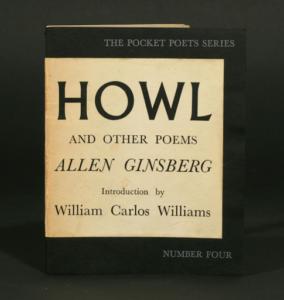
Fun fact: I met Allen Ginsberg in front of the Denver Public Library years ago. He was walking out, and I nearly walked into him. My eyes bulged. I looked around for confirmation that somebody was seeing him too, but we were alone. First comment out of my mouth:
Me: "Are you Allen Ginsberg?"
AG: "That is the name they call me."
What did that mean? I was flummoxed. I looked at him blankly, and he kept walking out. That was the extent of our relationship. Turns out I'd just missed a reading of his at the library.
When our current series on The Things We Build came up, Allen Ginsberg came to mind again by way of another writer. A decade ago, everybody was talking about a post published by Scott Alexander on his blog, Slate Star Codex. It was based on a poem by Allen Ginsberg called "Howl". Alexander had swirled that poem around with some game theory, and some human evolution, and what emerged from the bowl was an essay called "Meditations On Moloch".
"Howl" had been a wail of despair over what 1950's America felt like to Ginsberg – with its industrialization and its drive to achieve, build, accumulate. He called this dark impulse Moloch – the demon from the Bible who demanded innocent children as burnt offerings in trade for the group's survival. But these burnt offerings were peoples' souls breaking under intense competition, the shame of being defective, of failing to meet crushing expectations. Rivalry means someone must win, and someone must lose.
Adam made love to his wife, Eve, and she became pregnant and gave birth to Cain. She said, "With the help of the LORD I have brought forth a man." Later she gave birth to his brother Abel.Now Abel kept flocks, and Cain worked the soil. In the course of time Cain brought some of the fruits of the soil as an offering to the LORD. And Abel also brought an offering—fat portions from some of the firstborn of his flock. The LORD looked with favor on Abel and his offering, but on Cain and his offering he did not look with favor. So Cain was very angry, and his face was downcast. Genesis 4:1-5 NIV
Scott Alexander took Ginsberg's concept of Moloch and applied it to entire systems in our society. To him, Moloch is the destructive result of The Things We Build when individuals are only working competitively: someone wins, and someone loses. To win, we make decisions on short-term, rational criteria. For example, it's rational for fishermen to get out to the prime areas on the water and drop their gear first before the other boats. Everybody does the same thing, but over time the area becomes overfished. It's a race to the bottom but nobody can be the first to opt out of the competition without losing business.
The same applies with artificial intelligence, or arms races between nations – Moloch is the drive to build faster, regardless of the long-term danger. It applies even to an influencer on Instagram who decides to use filters to hide their imperfections. It's a Moloch-y decision because it makes everyone else need to use filters too. Again, it's a race to the bottom as everyone must hide the shame of their pimples.
This system of Moloch is driven by shame, and it is our fallen nature. But Jesus cracked this system. His acceptance of our vulnerability and shortcomings is what He asks us to offer to others: we must provide the place for others to drop their weapons, to drop their filters, and become vulnerable. In return, we must show each other our pimples.
And rather than short-term decisions that seem to be profitable in a competitive sense, Jesus asks us to make impractical, irrational long-term decisions based not on personal gains but on what encourages other human beings to flourish.It is to be generous, to take a back seat to others, to build community, and forgive others for their mistakes. Jesus is so countercultural because His lessons lead to a livable future away from the desolation of Moloch. He rejects competitive idols and delivers us from the shame we hide from one another.
This week, think about sharing a small vulnerability or personal shortcoming with someone — only what you are comfortable with. And as you do so, remember your identity in Christ, where your worth is inherent and completely unearned. Pimples are accepted.
by Carie Grant

